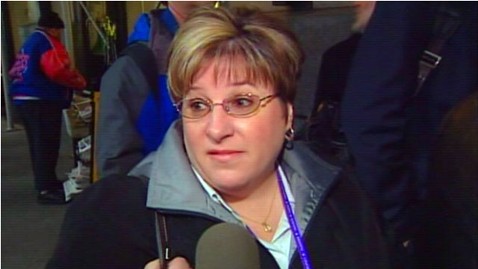Wall St. Commuter: “We’re All 99%. This Is Ridiculous.”

WABC-TV
As part of Occupy Wall Street’s plans for its largest protest ever, occupiers may garner more disdain from the 99 percent than the 1 percent by attempting to clog New York’s subway system. The notion of disrupting transit in the nation’s largest city isn’t sitting well with commuters, few of whom are Wall Street titans.
One commuter to the financial district expressed her frustration today over delays on her commute every day this week. Her normal commute should last about seven minutes but now takes 25 minutes.
“This has been every day for this past week, 25 minutes to get from Canal to Wall. It’s shameful — we are all 99 percent, this is ridiculous,” the unidentified woman told WABC.
The protesters’ “Day of Action” included rallying around the New York Stock Exchange to try to shut it down. Police blocked off the area surrounding it, Broad Street and Wall Street, and have made several arrests but business went on at the exchange as usual.
The goal of the protesters is to cause a disruption after anger at police and the city for clearing out their camping grounds in Zuccotti Park early Tuesday morning. Protesters plan to ride the subway this afternoon and march over the Brooklyn Bridge at 5 p.m. But who are they really disrupting?
Two-thirds of subway users, generally the people with the lowest incomes, pay $2.25 for a single ride. About a third of subway riders pay $104 for a 30-day subway pass, which tend to be the wealthiest users of public transportation, according to the New York Times. The income levels of subway riders are hard to come by, as New York City’s Metropolitan Transportation Authority (MTA) doesn’t collect and distribute that data.
[Live blog of Occupy Wall Street's "Day of Disruption" in New York City]
The New York City subway system has 468 stations, the largest number of public transit subway stations of any system in the world, according to the MTA. On an average weekday, 5,156,913 rides are taken on the subway. The Census Bureau’s American Community Survey reports 57.8 percent of New York City’s commuters use the subway, 21 percent walk, 7 percent drive alone, 2.3 percent carpool and 6.3 percent work at home, according to survey estimates from 2005 to 2009.
Lydia Jung, an administrative assistant who commutes to Manhattan from the borough of Queens, said she “wholeheartedly” supports protesters’ desire to assemble, but most New Yorkers are “very touchy” when it comes to MTA disruptions and delays.
“With fare hikes and service cuts, it takes very little for me and almost everyone else I know to be set off by further delays,” Jung said. “Everyone I know already has a long enough commute home. We just want to get home at the end of the day.”
Jung said disrupting services would unlikely win the support of the apathetic New Yorkers.
“If anything, there’s a very real possibility that it will create opposition from the people that would have supported them in theory,” she said.
At least one commuter defended the protests.
“It’s a small inconvenience for the ability to have everybody to be here on the street letting their voices be heard,” an unidentified man told WABC.
But commuters across the country are losing their empathy or patience with the protesters.
In Philadelphia, Gina Carrano, 30, said her biggest concern during her commute to city hall, where Occupy Philadelphia protesters have gathered, is sanitation.
“The subway is right below so a lot of protesters were going down and relieving themselves,” the legal reporter said. “I used to take their train to work but a week or two after the protest started, I stopped because the stench was so bad.”
John Tabacco, CEO of Locatestock.com, was so frustrated with the disruption by his office near Zuccotti Park that he started a “Free Wall Street” campaign on Thursday.
Tabacco is inviting other financial firms, business owners and commuters, to “rally” in opposition to Occupy Wall Street.
“The way to end any Occupation is to form a coalition of freedom fighters to rebel against the unwanted occupiers,” he said in a statement. “Since its inception, Occupy Wall Street protesters have caused problems for local businesses and hard working people that work on Wall Street and surrounding offices near Zuccotti Park.”